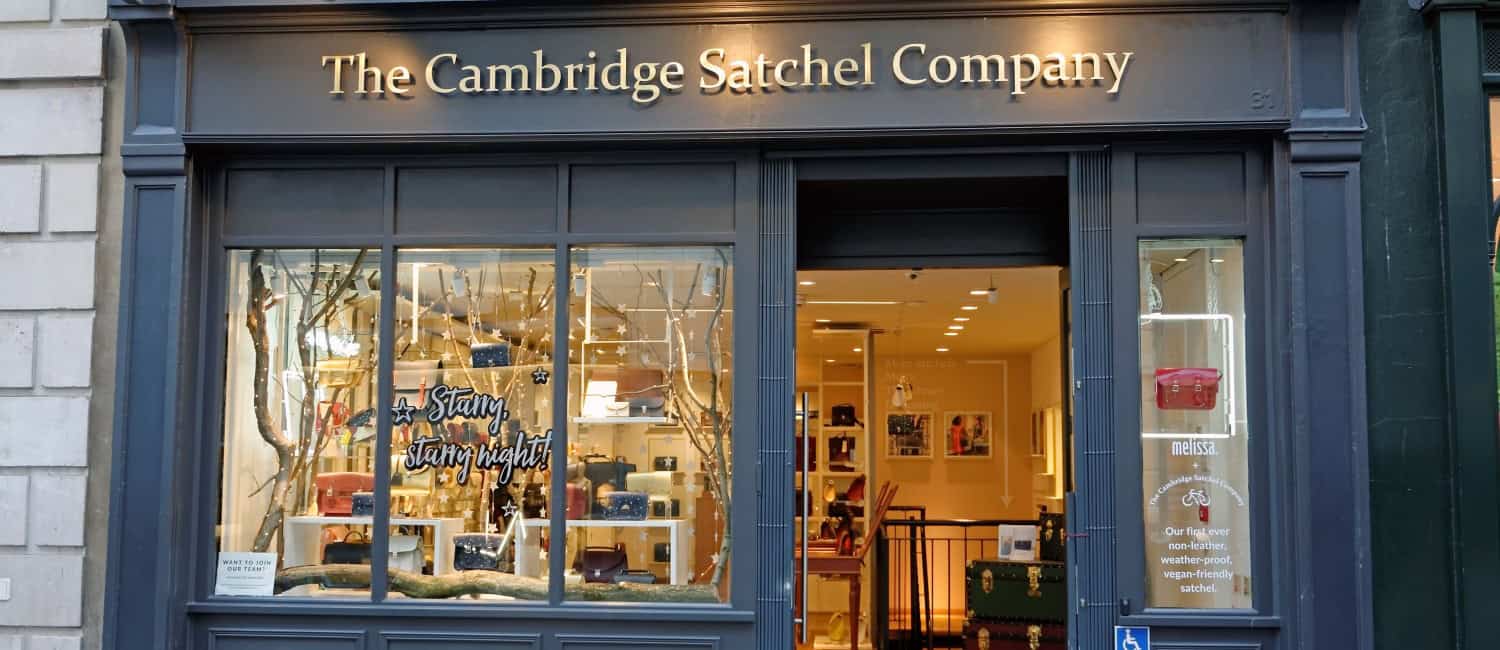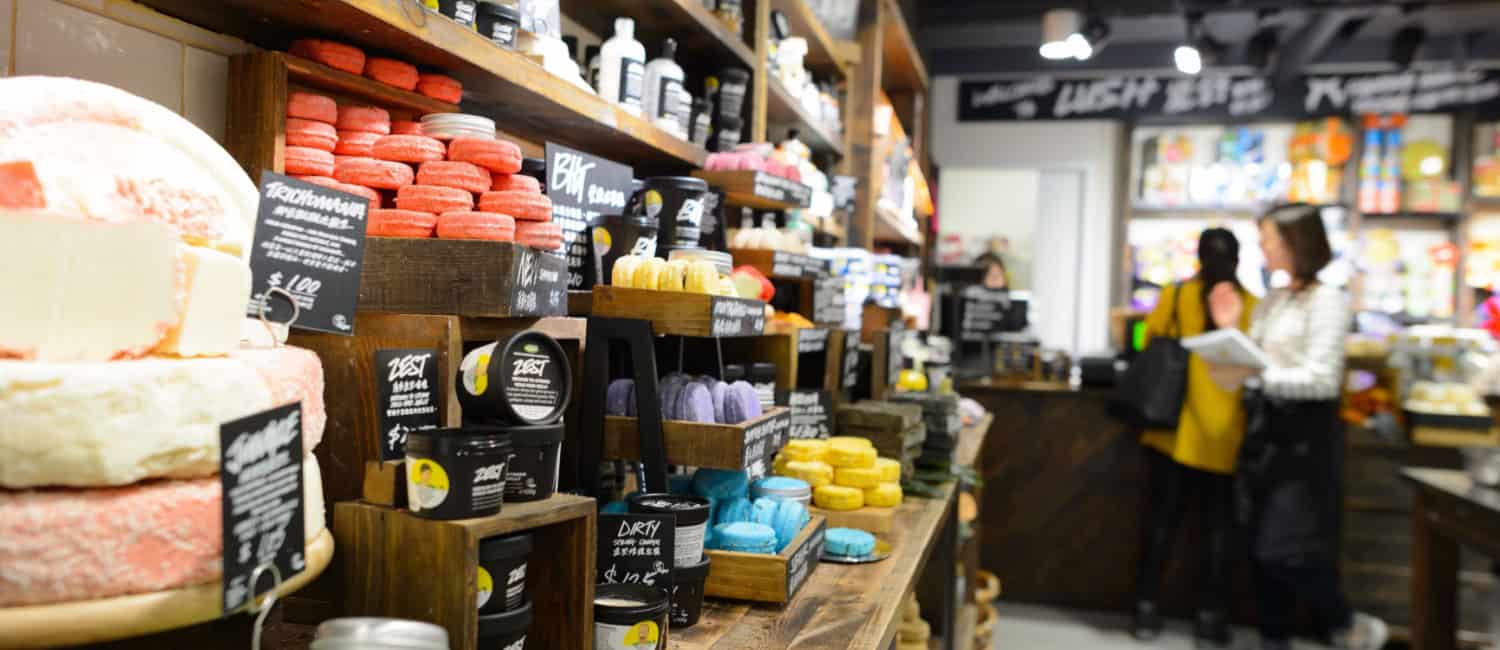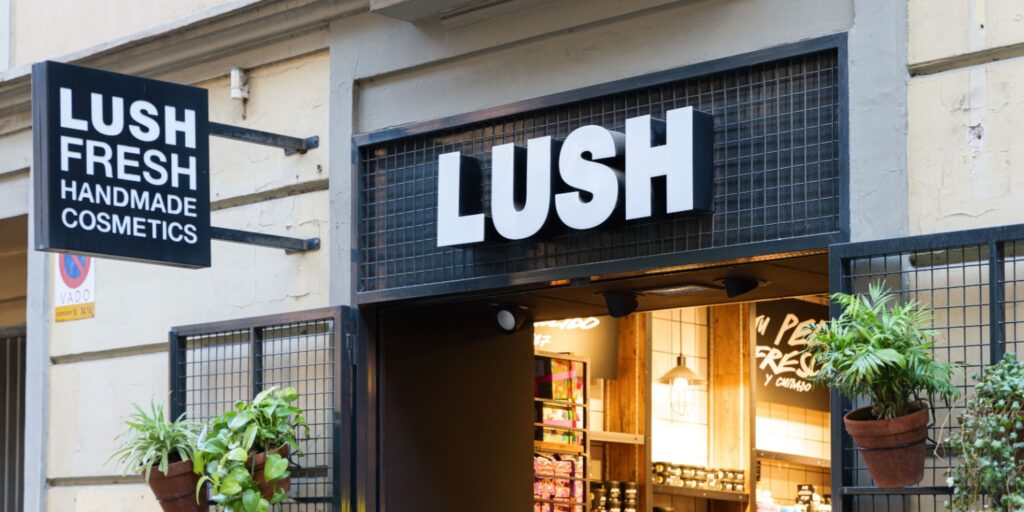Imagine starting a small business from the gym floor, a tiny kitchen, or your partner’s spare room. Many of today’s successful UK businesses have humble beginnings. Despite this, these British entrepreneurs have built thriving companies thanks to a few things in common: ambition, perseverance, and an unwavering belief in their business ideas.
Whether you’re thinking about registering a limited company or curious about the backstory behind some of the UK’s biggest brands, this content series will show you that you don’t need a huge budget to build something impressive from the ground up.
Let’s look at some of the most inspiring success stories from UK entrepreneurs, who have transformed their small business ideas into household names.
Key Takeaways
- The Cambridge Satchel Company started out from a kitchen table, with the founder having just £600. Julie Deane’s satchels then made waves at London Fashion Week and revolutionised the traditional British accessory.
- Gymshark’s founder, Ben Francis, started his company as a student while juggling pizza deliveries and lectures. He now has a net worth of $1.3 billion and a thriving fitness community.
- If you have an entrepreneurial spirit and a great business idea, there’s no stopping you from setting up a UK limited company with very little.
1. Levi Roots Reggae Reggae Foods
Ever tasted the famous Reggae Reggae Sauce? This homemade recipe, inspired by the rich flavours and spices of the Caribbean, took the UK food industry by storm when it became a multimillion-pound brand. But its extraordinary success didn’t come overnight.
Levi Roots grew up in a tiny village in Clarendon, Jamaica. While his parents worked in Brixton, earning money so their sons could join them in the UK, Levi spent time with his grandmother. By her side in the kitchen, he learnt the secrets behind flavouring food with Caribbean herbs and spices. When it was his turn to move to London, he was inspired by the fusion of food and music at the Notting Hill Carnival.
For years, Levi made his Caribbean-inspired sauce from his kitchen in Brixton with the help of his kids and carried bottles of it around to sell by hand. This was all because banks and businesses continually dismissed his idea. However, when he was spotted at the World Food Market and invited to pitch on Dragons’ Den, he won over Peter Jones, who helped him secure a spot for his sauce on the shelves at Sainsbury’s.
However, every great entrepreneurial journey has its ups and downs, and Levi Roots’ story is no exception. Just as his business was taking off, he faced a lawsuit. Someone Levi previously ran a stall with at Notting Hill Carnival claimed he created the sauce, leading to a legal battle that drained Levi and his company of over £1 million. This was a brutal lesson for Levi to sort out the legal side of a business early on and clearly define ownership.
Since Levi won the court case, his brand has expanded into ready meals, drinks and desserts, bringing the warmth and spice of the Caribbean to tables around the UK. His story is a testament to resilience; despite a tremendous setback, he learnt a critical lesson and didn’t let this stop his business from growing.
2. The Cambridge Satchel Company

With just £600 and her sights set on giving her children a better education, Julie Deane launched The Cambridge Satchel Company. In 2008, she was sitting at her kitchen table and came up with the idea to reinvent the classic British satchel – putting a contemporary spin on the timeless style by crafting it with high-quality, sustainably sourced leather and in an array of bold designs.
Her fluorescent and metallic designs soon caught attention, and by 2010, the brand’s Fluoro Satchels graced London Fashion Week. So far, this is the story of a thriving business, but Julie Deane had to fight a battle on her journey to success.
Firstly, she faced an unexpected betrayal when the factory she entrusted to manufacture her satchels tried to steal her designs. This breach of trust from the factory, combined with the discovery of 330 fake websites and social media accounts trying to sell imitations of her satchels, threatened her brand.
Rather than letting intellectual property theft destroy what she had created, Julie took matters into her own hands. As demand soared, she opened her own workshop in 2011, bringing production in-house and ensuring she had full oversight. To protect her brand further, she used non-disclosure agreements (NDAs) when working with third parties, shut down fake websites and counterfeits, and enforced her trademarks aggressively.
A turning point came when Google featured Julie Deane’s backstory in its Google Chrome ad series, racking up 6 million views and spotlighting The Cambridge Satchel Company globally. Since then, the brand has collaborated with Vivienne Westwood, Brompton Bicycles, and The Prince’s Foundation, proving that a simple idea – backed by quality craftsmanship and a mission – can grow into a redefined British accessory.
3. Not on The High Street
If you’ve ever searched for a quirky gift to delight someone special, Not on The High Street may have come to your rescue. This online marketplace houses inspiring gifts, all designed and crafted by independent retailers with small-business dreams of their own.
Back in 2006, Holly Tucker and Sophie Cornish identified a need for an e-commerce site that gave small, creative businesses a platform to sell unique items. They launched their website, onboarded 100 retailers, and had to lean on funds from family members to keep the business afloat.
For Holly, it was a case of surviving the early days of building a business. In an interview with Good Housekeeping, she recalls crying over unpaid childcare fees and not having heating during the winter months. She also faced the difficult reality for many working parents who set up their own company: the gut-wrenching guilt of missing out on creating memories with their children. Despite the struggle, Holly persevered with belief in her vision for Not on The High Street.
Fortunately, the founders’ hard grafting and adaptability paid off. Holly Tucker is now known as one of the UK’s most respected entrepreneurs and Not on The High Street has a stock of over 350,000 products from 5,000 hand-selected entrepreneurs.
4. Lush

When you think of Lush, vibrant bath bombs, fragrant stores and activism-driven branding may come to mind. But this UK business has humble origins. Founded in 1995 by Mark Constantine and Liz Weir, Lush began as a small, basic shop in Poole. Now, it’s a renowned cosmetics retailer with a memorable brand identity and engaged community.
The founder duo had a shared passion for innovative, ethical beauty products. After supplying handmade cosmetics to The Body Shop, they faced financial setbacks and had to sell their first business. But they bounced back with a bold vision.
Using their personal savings, they began handcrafting products with fresh, organic ingredients and writing the daily specials on a chalkboard from their simple store. Their commitment to vegetarian, cruelty-free cosmetics with minimal packaging set them apart and helped create a loyal customer base.
Today, Lush is an industry leader, known for its inventive products, community of conscious consumers, and visually appealing stores.
5. The White Company
Beautiful stores. A sleek online shopping experience. Stylish products (90% of which are white). That’s The White Company we know now. But over 30 years ago, Chrissie Rucker didn’t know she’d be the founder of a multichannel, international business. Instead, she was shopping – without much luck – for affordable, good-quality white bed linen.
Identifying a gap in the market for elegant homeware at an affordable price, Chrissie decided to invest her savings into launching The White Company from her boyfriend’s spare room. It started as a mail-order brochure with a modest 12 pages.
Yet, in 1995, Chrissie won the Small Business of the Year Award from Midland Bank & SHE Magazine and received some much-needed investment. After just four years, The White Company was listed the 28th fastest-growing company in the UK. In 2007, the brochure gained an extra 118 pages, packed with luxurious homeware products and lifestyle inspiration. Today, the company has a US website and 70 stores across the UK.
6. Gymshark

Gymshark is proof that student side hustles can grow into highly successful UK limited companies. Fitness enthusiasts will recognise the shark logo from a mile away – it features on clothing and accessories, and is the hallmark of flattering, functional and trending sports apparel. The brand now boasts a social-media following of over 3 million, plus customers worldwide.
Gymshark’s founder, Ben Francis, was juggling university lectures in Birmingham, pizza-delivery shifts, and workouts when he realised he wanted to break into the fitness industry. After launching a few unsuccessful workout apps and a social media network, things changed when he set up a website domain. In 2012, Gymshark was incorporated with no financial backing. Dropshipping supplements was the answer to not being able to afford any stock.
Later, the brand started selling gymwear, but it wasn’t what Ben envisaged. So, he began sewing and printing his own designs from his garage. He sent products to bodybuilders, who shared them with their following – an early example of influencer marketing. When Ben invested almost all of the company’s money in having a small area at the BodyPower Expo 2013, the response was overwhelming and solidified Gymshark as a trusted fitness brand.
From there, Gymshark grew rapidly, hosting its own lift events and expanding globally. In October 2022, it opened its flagship store on Regent Street, and is now widely known for its innovation and growing community. As of January 2025, Gymshark’s founder has a net worth of $1.3 billion.
7. Charlotte Tilbury

From giving her classmates makeovers at school, Charlotte Tilbury has gone on to disrupt the beauty industry in the UK and beyond. Her journey can only be defined by relentless hard work and an obsession with perfection.
The first step she took was assisting the legendary makeup artist, Mary Greenwell, during the iconic supermodel era. She learnt from the best in the industry before experimenting herself, mixing her own ‘magic cream’ backstage at fashion shows and photoshoots, and refining formulas that would later fly off the shelves.
She knew what she wanted to achieve: makeup that didn’t cake and formulas that felt like a second skin. This is why she didn’t stop collaborating with chemists to achieve the exact textures, ingredients and results she envisaged.
In 2012, she created her own YouTube channel with expert beauty tips and tutorials that spotlighted supermodels. The following year, she launched Charlotte Tilbury Beauty at Selfridges, revolutionising the industry with luxurious and effective products, before opening her flagship store in Covent Garden in 2015. A lesson we can take from Charlotte Tilbury’s success story? Become a master of your craft and refuse to settle for anything less than perfection.
8. Pasta Evangelists
Not all hope was lost when Alessandro Savelli witnessed the failure of his smartphone business. Despite this leaving him and his shareholders with nothing after 8 tough years, he decided to launch another company, taking inspiration from one of life’s simplest pleasures: eating pasta. Now, Pasta Evangelists is a thriving cook-at-home, fresh pasta company in the UK.
Using his nonna’s pesto recipe and making tortelloni from his flat, Alessandro was determined to bring the flavours of Italy to kitchens around the country. He invested just £2,000 of his own money into the business and secured an extra £6,000 from investors, including Prue Leith (known for her culinary expertise and sweet tooth as a judge on the Great British Bake Off). Two years later, he was invited to appear on Dragons’ Den, only to be rejected.
But a rejection from the dragons and then the pandemic didn’t stop him. In fact, lockdown created an opportunity for his company to launch a Deliveroo service, delivering restaurant-quality pasta right to people’s doors and bringing a taste of Italy to their homes. Today, Pasta Evangelists delivers quality pasta, offers pasta masterclasses, and has a restaurant in the prestigious Dining Hall in Harrods.
9. Butternut Box

It all started when Dave’s family rescued a Staffie named Rudie. Dave quickly realised that traditional meat-based pet food – often full of animal by-products – wasn’t good for her health. Determined to make a change, he and his friend Kev (both working in banking at the time) began preparing fresh, home-cooked meals for her in their kitchen.
By 2014, their passion project became Butternut Box, a fresh dog food subscription service, delivering quality, well-balanced meals directly to pet owners’ doors. As the brand grew, so did its commitment to sustainability. It launched plant-based options and achieved B Corp certification in 2022.
Building a business often means taking risks – something that Dave and Kevin know all too well. They both left the financial stability of investment banking, quitting their day jobs to dedicate their time fully to growing Butternut Box.
Taking this leap was just the beginning. They soon realised that their original vision of delivering fresh food weekly wasn’t a scalable business model. As demand grew, they had to make the difficult decision to pivot to a frozen-food model and reduce delivery frequency.
As well as taking a huge financial risk by quitting their jobs, the founders of Butternut Box demonstrated adaptability. Despite moving away from one of their original USPs, they took the risk to evolve their business model early on, when needed, to ultimately make it more scalable and successful.
Butternut Box since secured a staggering £280 million investment in 2023, which jumpstarted its expansion across Europe. What started as a desire to improve one rescue dog’s health is now a sustainable UK business that has challenged the traditional pet food industry.
10. Boden
Head to the Boden headquarters on a trading estate in Acton, London, and you might question if you went to the right place. The company’s head offices don’t seem fit for one of the UK’s biggest fashion retailers. Yet they’re very much like Boden’s beginnings: understated and unexpected.
Boden is known for its characterful prints and elegant styles. These embody the wardrobes of yummy mummies and butter-wouldn’t-melt-in-their-mouths children across the country. And it all started in 1991, when Johnnie Boden hand-drew a catalogue featuring just eight menswear styles he wanted to wear himself. The whole idea back then was a risk – Johnnie’s target audience wouldn’t have dreamt of ordering their stylish clothing from a catalogue in their living rooms.
His journey was a rollercoaster, from putting his house on the line to keep the company afloat to being told he was “a failure” by his wife – all while working 24/7. A year later, when he discovered men didn’t spend much on clothing, he launched womenswear and later childrenswear. At this point, he was still running everything solo, including designing and photographing the products.
Fast forward over three decades, and Johnnie and his family are still involved in the business, maintaining the brand’s British charm and family values that its customers adore. Everything is designed and produced internally, yet Boden is now a global company.
Ready to start your own UK limited company?
These UK entrepreneurs demonstrate that a great idea, fuelled by passion and commitment to make it happen, has no boundaries. There are many myths about what you need to bring an idea to life. Not having a large budget, fancy office, or extensive corporate experience shouldn’t prevent you from growing your idea. As we’ve seen, many successful UK businesses have come from humble beginnings. So, don’t let these misconceptions hold you back.
If you want to start a UK limited company, know it can be straightforward with the right support and drive to make it succeed, discover our cost-effective company formation packages. They have everything you need to start trading quickly and get your company off to the best possible start. Keen to learn more about starting and growing a business? Check out other helpful articles on the 1st Formations blog.
Please note that the information provided in this article is for general informational purposes only and does not constitute legal, tax, or professional advice. While our aim is that the content is accurate and up to date, it should not be relied upon as a substitute for tailored advice from qualified professionals. We strongly recommend that you seek independent legal and tax advice specific to your circumstances before acting on any information contained in this article. We accept no responsibility or liability for any loss or damage that may result from your reliance on the information provided in this article. Use of the information contained in this article is entirely at your own risk.










Join The Discussion
Comments (2)
Thanks for the article! The stories of these businesses provided me with some tips for my own professional UK accountants blogs.
Thank you for your kind comment.
We are very pleased you enjoyed these stories.
Kind regards,
The 1st Formations Team